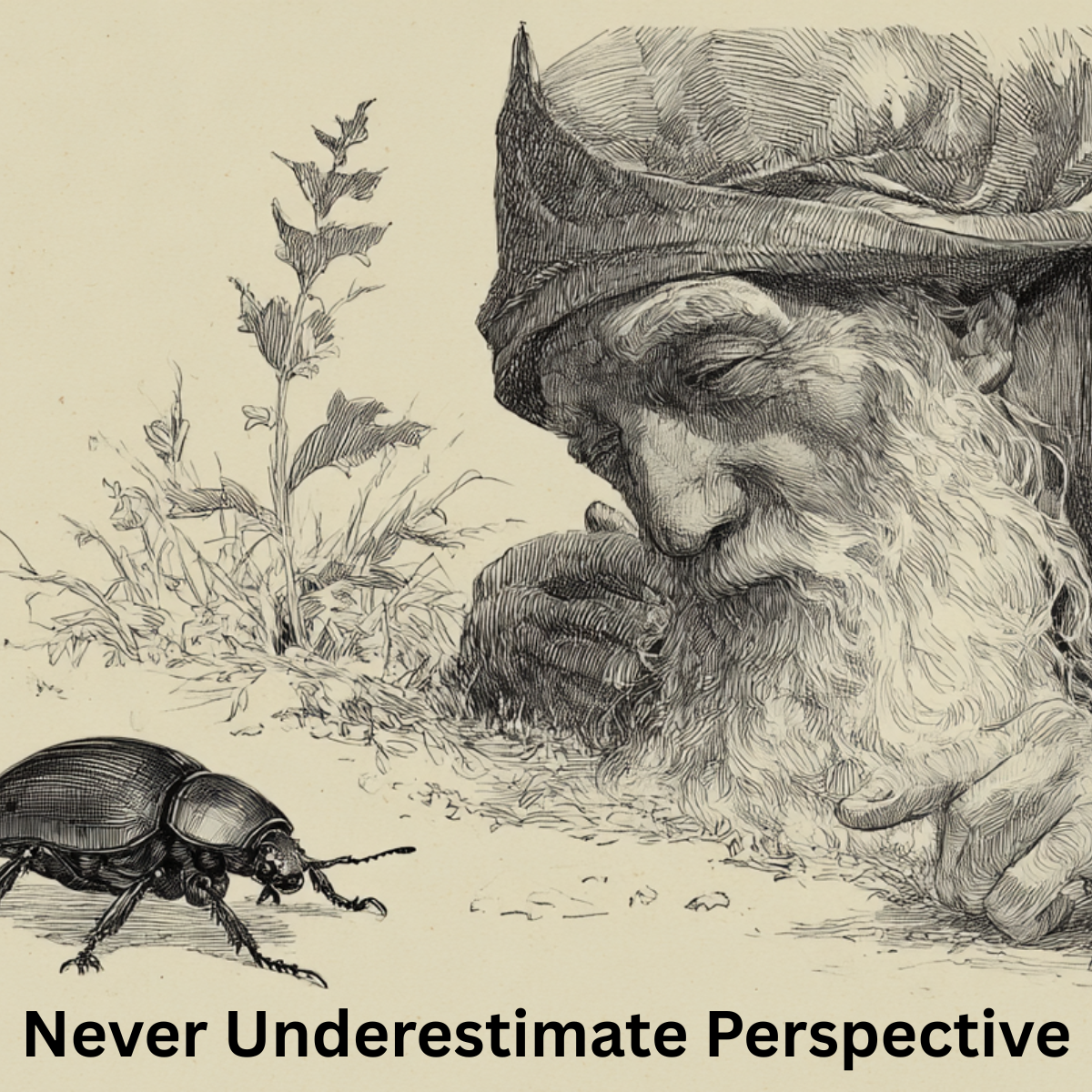When you are talking to another person, they have a perspective. That perspective is influenced by many factors, and is at any given moment a complex snapshot in time of a culmination of all their thoughts and experiences coming to a moment of singularity, the conversation with you. So when you are speaking with another person and trying to convince or persuade them to take a course of action, you would be wise to pause and reflect on what their perspective may be.
This moment of clarity brings with it a consideration of scope. All of us have perspective, but that is significantly impacted by the scope and boundary of control that a person has. Think of the small bug crawling across your kitchen table. Certainly, their perspective is much more limited than yours, but what of their scope? That bug has a certain level of control in their environment. In fact, that bug may be a beetle, and that particular beetle might strike fear into all the insect kingdom, but here you are looking down at it, making a decision to smash it or let it crawl on its way.
This is an extreme example, the difference in perspective and scope between a bug and you. Take for consideration the difference in perspective between you and a young child. The young human has a limited perspective, surely. Limited to where they are permitted to interact by parents and guardians. They do not understand the dynamics that are going on around them, much less the larger socio economic challenges and the role their family plays in that drama. The perspective and scope of their view of the world is not as far from you as a beetle, but there is a gap nonetheless. You certainly would not yell at a toddler for falling down after trying to stand, because you know this is part of the process. You have perspective. You also realize that they are going to fall and try again many times before they finally succeed. You have a larger scope. The toddler, trying desperately to stand, sees this as one of the most important things they need to be trying right now. You see it as important as well, but due to the scope of your understanding, you realize that if the toddler learns to walk today or next month, there is little difference.
You are not going to tell this to the toddler. You are going to give praise and encourage them to keep trying. Now that we have taken a look at that scope, narrow the gap even further. One of your employees, for example. You may view their lack of experience, expertise, or both as a consideration when evaluating the gap between you, but based on these previous examples, the gap does not seem that wide. When I was teaching at a college, I had the opportunity to have many people from various age groups and backgrounds come to take classes. In most cases, the knowledge gap on the subject matter was significant, but in other areas, not so much. The ability to separate their perspective from mine, and the scope of their consideration, was much more difficult. Oftentimes, I was much younger than the person that I was teaching, and therefore that distinction was never easy. If you are in a mentor role, employer, or educator, this challenge is always common. Understanding that your perspective and the scope of what you are concerned about is much different than the person that you are talking to is important.
Yet the narrower the gap, the less clarity we have in this. We might even see the person we are speaking to as a potential source of conflict or competition. This is an error, and leads to many misunderstandings in relationships that should otherwise be thriving. This has been one of the hardest lessons to learn as my children have gotten older. They are smarter now, they have quick minds, and are starting to gain a larger perspective of the world. However, their scope is still limited. What seems obvious to me will not be so for them for many more years. I can explain away until I am blue in the face, and they will still not understand. The mistake is easy to make. As adults that have been at this a while, our scope and perspective do not change much. Sure, we improve, but only slowly. Young adults are expanding rapidly, so our ability to see clearly that gap that exists between us is not easy. When we should be dealing with them more like we would that beetle, we are treating them more like fellow gladiators in the arena.
Some of the most regrettable things that I have said to another human in my life have come from a sincere desire, but were misplaced because the person I was speaking with did not have my same perspective, nor the same scope of coverage that I did. Often, you can accidentally think you are helping with a bit of sage wisdom, advice, or a warning, but what you might end up doing is crushing them under the weight of the perspective that you do carry. Sure, that beetle can carry thirty times its body mass, but that does not mean that you should place a brick on top of it. This is the problem we always face when talking to those with a different perspective, especially those that have not seen or experienced as much as we have.
I suppose it now makes sense to extend this in the other direction. There are those that you communicate with who may have a far greater scope than you as a person, or have a more comprehensive perspective. I would always chuckle when I would invite my CEO to meet with my team when I worked for a larger corporation. The young engineers or salespeople would always like to pepper the CEO with inquiries about things that were obviously broken. Why don’t they do something about this issue? This is perspective talking. They almost always cannot grasp or understand the larger issues that the CEO is facing, and the urgency of any particular crisis. A good CEO smiles, acknowledges their concerns, and asks for more clarification. A bad leader would start to lecture them on how little they know, and how dare they bring these trivial matters up when something so much more important is at stake.
So the next time you find yourself in conversation—whether with a child, a colleague, or someone whose experience is vastly different from your own—pause for a moment. Ask yourself what their perspective might be, and consider the scope of influence they carry. Are they navigating a narrow stretch of understanding, or are they contending with burdens you cannot see? This reflection may not solve the tension between you, but it will create space for empathy to grow, and in that space, communication becomes more than just exchange; it becomes connection.
Perspective and scope are not merely philosophical abstractions. They are the practical boundaries that shape how we see and act in the world. And if we are wise, we will recognize that we are not always the ones with the broader view or the greater power. Perhaps, just beyond our perception, there is a divine force watching, weighing, and choosing. I do not know the full nature of that force, but I find myself hoping—deeply hoping—that it chooses to guide with care, to observe with compassion, and not to crush without cause.
Let that hope inform how we speak to others, especially those who seem small or slow or unsure. Because in the great scope of things, we may be far closer to them than we realize.




